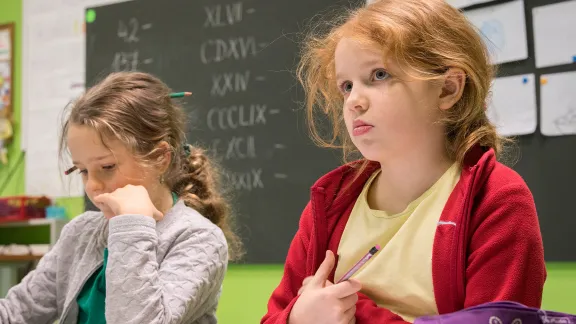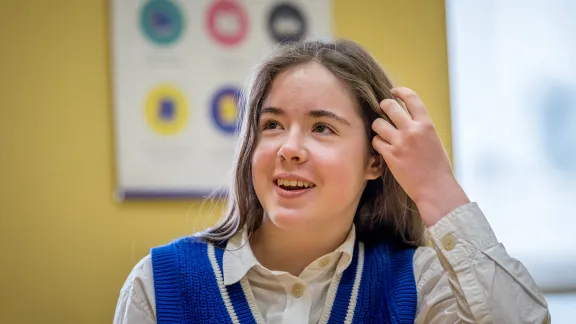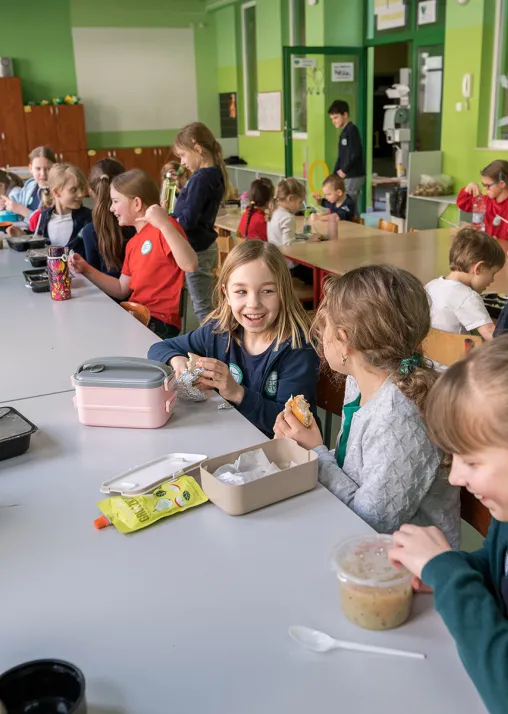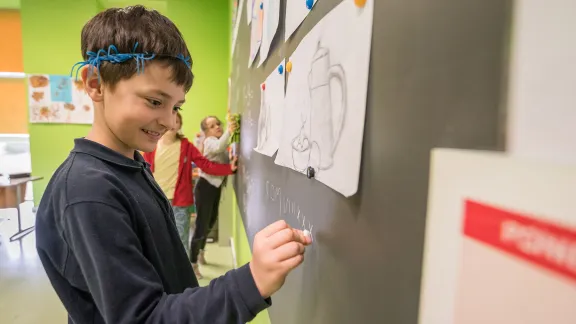LWF supports twelve Ukrainian refugee students who attend the Albert-Schweitzer- School in Gliwice, Poland, a Protestant school with a Lutheran profile. This is a great support for them and their families.

The class of Zolomya and Jegor, learning Roman numbers in their math class. Photo: LWF/ Albin Hillert
LWF scholarships for Ukrainian refugees in Poland
(LWI) - “This school is very different. It is not like an institution, more like a family. This school has been one of the biggest supports for us,” says Kalina Mokrya, a refugee from Ukraine and mother to three girls. Her daughters all attend the Albert-Schweitzer- School in Gliwice, Poland, a Protestant school with a Lutheran profile. LWF pays the school fees for twelve Ukrainian refugee students, who do very well at the school.
Looking at a group of students, one would not be able to tell apart the Ukrainian and Polish children. The children, who fled the war last year, take part in games and conversations in Polish like anyone else. Vladislava, called Vlada, is 15-year-old girl who seems to be known by everyone. She is Mokrya’s eldest daughter. In very good English, she talks about the school, her dreams and her plan to study law one day.

Vlada Mokryk, from Kyiv. Photo: LWF/ Albin Hillert
The war in three minutes
The entire family remembers the day the war started. The mother woke up her girls, crying, telling them the city was being bombed. Vlada, unfazed, asked if they could order takeout food, because everything was closed. “I wanted to shake her, but then I realized: she is a child. This is her way of protecting herself”, her mother says.
Reality caught up with the children soon enough. During the first days, the children slept in the bathroom of their Kyiv apartment, because the family thought it was the safest room in the apartment. Kalina shows videos on her mobile phone, the children in a nest of blankets in the bathtub and on the floor, sandwiches and a Ukrainian flag in from of the mirror. The family left Kyiv ten days after the air strikes started. Vlada packed like for a vacation: powerbank, tablet, her favorite handbags and a swimsuit. “I hoped it would end in a week. Now it is a year,” she says.
Vlada misses her home city and her friends. They still send each other messages; the teenager sees how her peers back home discuss homework and the occasional air raid. For a classroom presentation at her new school, she talked about the animals that were killed by naval mines and submarines in the Black Sea. “I read about it on social media, and wanted to tell my classmates about it”, she says. “Also, it is easier to talk about the dolphins than the war itself. There are so many horrible things – how do you put a war into three minutes presentation?”

Children share a meal during recess. Photo: LWF/ Albin Hillert
Education is a topic of discussion for many refugee families. More than half of the refugee children from Ukraine are not attending a public school but follow lessons from their Ukrainian school online. The Polish school system made a special allowance for this arrangement. Parents have many reasons to prefer online classes: some want to make sure that their children pass the entry exams for the next level in Ukraine, others are worried about the children forgetting their mother tongue.
Many thought the war would be over within months, and they would be able to return home. One year after the COVID-19 pandemic was declared over, millions of Ukrainian children again are deprived of the peers, the experiences and the interactions that are part of a normal school day.
Teaching not to hate
Some children also struggle in the public schools, which must accommodate large numbers of refugees and cannot always give extra attention to children who have been traumatized by the war. Such was the case with 8-year-old Jegor (name changed) from Kharkiv, who transferred from a public school. In his grade, Vlada’s younger sister Zolomya welcomed the shy boy with open arms and for the first weeks, interpreted for him, his teacher recalls. Now, Jegor participates in class like any other student.

Jegor during Math class. Photo: LWF/ Albin Hillert
Small classes and a friendly atmosphere at the Albert-Schweitzer-School made it easy for Vlada and the other Ukrainian students to integrate. “I like the way everybody supported me here. I have friends, nobody is mean to us,” Vlada says. She did not want any special treatment and half a year after escaping Ukraine, she took the end year exams like the other students. “I had read all the Polish literature on the curriculum”, she says proudly.
40 teachers, 50 staff and 150 students: the school is proud of its academic record and its profile. Religious education and Christian values are part of the school day. “This is a place where the students can develop their individual skills,” the principal says.
For Kalina Mokrya, the school’s teachings go way beyond the next exams. “I am already thinking about the time after the war,” Kalina Mokrya says. “We need to help our children not to hate. Right now, that is very hard.”


